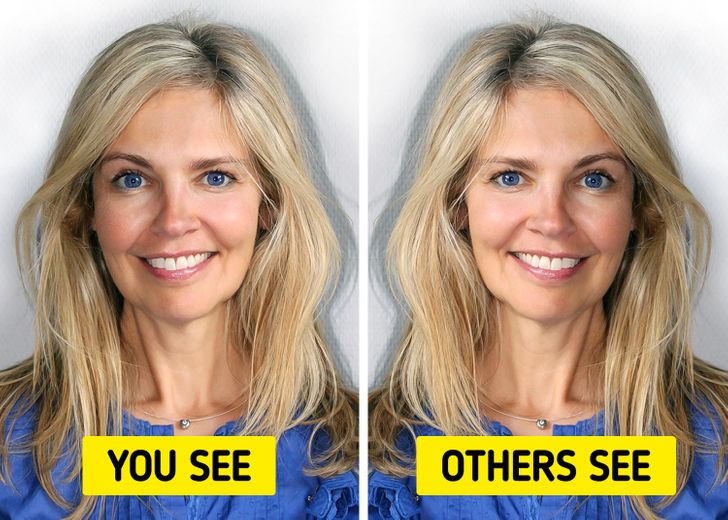The back camera shows how others see you. It captures your image from a distance.
When it comes to understanding how others perceive your appearance, the back camera is the most accurate tool. Selfies and mirror images may not accurately reflect how others see you. In the world of social media and online interactions, understanding your true on-camera appearance is crucial.
With the abundance of images we share on platforms like Instagram and Facebook, it’s important to know how others truly see us. The way we present ourselves in photos can significantly impact our personal and professional relationships. Therefore, knowing which camera accurately represents how others perceive us is essential for maintaining a positive online image. Understanding this concept can help individuals better manage their online presence and make a favorable impression on others.

Credit: brightside.me
Finding The Truth In Photography
When it comes to understanding how others see you through the lens of a camera, it’s essential to consider lens distortion and focal length. These factors significantly impact the way an image represents a subject, influencing perceived proportions and distances. Additionally, gaining insight into the science behind camera sensors and lighting is crucial to comprehend how these elements affect the captured image’s fidelity to reality. By understanding these technical aspects, individuals can gain a better perspective on how their appearance translates through the lens, ultimately shaping their approach to photography and self-perception.
Which Camera Shows How Others See You
Which Camera Shows How Others See You is a topic that has piqued the interest of many individuals, leading them to explore the disparities between the front and back cameras on their devices. There is an ongoing debate about the accuracy of mirrorless and DSLR cameras in capturing a realistic perspective of an individual.
Perception Vs. Reality In Portraits
Have you ever wondered why you look different in photographs compared to the mirror reflection? The impact of camera angles on appearance is profound, as it can distort facial features and body proportions. Moreover, the psychology of self-perception in photographs plays a crucial role in how we interpret our own image and how others perceive us. Understanding these factors can help in realizing that the image captured by a camera may not always reflect reality. Therefore, gaining insights into the differences between perception and reality in portraits is essential for a more accurate understanding of how others see us.
Achieving Authenticity Through Lenses
Photographers aim to capture the authentic you through their lenses. Choosing the right lens is crucial for a true-to-life representation. Techniques such as utilizing natural light, framing, and angles can all contribute to showcasing your genuine self. The camera lens serves as a window to how others perceive you, and it is essential to prioritize authenticity in every shot. By understanding the impact of different lenses and photography techniques, photographers can create images that reflect the true essence of the subject. Through skillful use of equipment and mastery of techniques, photographers can deliver portraits that truly represent the individual in their most authentic light.
The Role Of Software In Image Authenticity
Photo editing plays a significant role in altering perception, as software filters and effects can either enhance or deceive the authenticity of an image. The use of software can impact how others perceive the visual representation of an individual. It is essential to consider the ethical implications of altering images, as this can influence the way people are viewed by others. Understanding the impact of filters and effects on image authenticity is crucial in portraying an accurate representation of oneself.
Selfie Culture And Public Perception
The influence of social media has resulted in heightened image expectations. Professional photography often presents individuals in a carefully crafted manner, while self-taken images may convey a more candid and unfiltered impression. The prevalence of social media has led to a culture where self-portraits play a significant role in shaping public perception. Individuals often question whether the camera lens accurately portrays how others see them. It is important to understand the nuances between real-time appearances and captured images, considering factors such as lighting, angles, and the inherent differences between mirrors and photographs. Ultimately, the way we are depicted in photographs reflects the version of ourselves that resonates with others, emphasizing the positive reception of our image by external observers.
Frequently Asked Questions For Which Camera Shows How Others See You
Is The Camera How Others See You?
The camera doesn’t show how others see you. It presents a reversed image. Other people generally like the version they see. Mirror shows reversed image.
Is Your Mirror Image What Others See?
Your mirror image is reversed compared to what others see, as it is not familiar to them.
How Do You See How Other People See You?
To see how others see you, use two mirrors set at angles and stand in between. Adjust them until they’re not distorting your image. This is what everyone else sees. Photos and mirrors can differ due to angles, lighting, and lenses.
Mirrors reflect you accurately in real-time.
How Do I See What I Really Look Like?
To see how you really look, use a real mirror. Phone camera images can appear slightly different due to angles and lighting.
Conclusion
In essence, the back camera reflects how others perceive you. Despite any perceived discrepancies between mirror images and photographs, the general consensus is that others appreciate the version of you displayed in visuals. Ultimately, the way we appear in photos is the way we present ourselves to the world.
